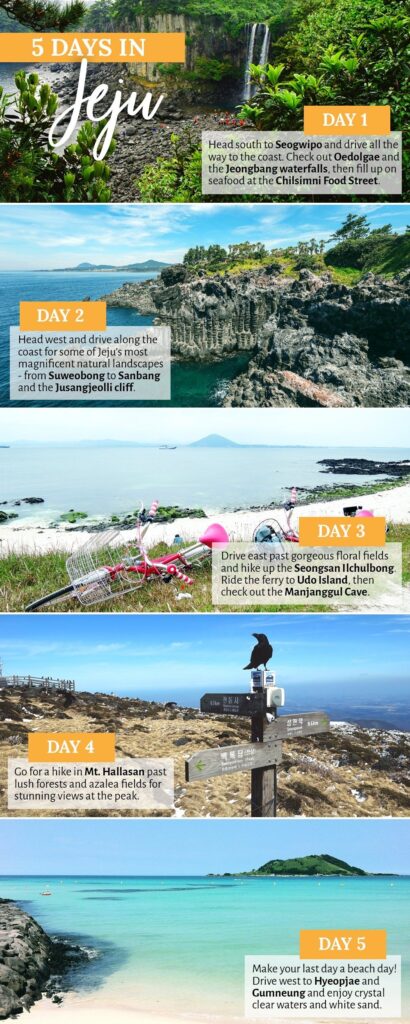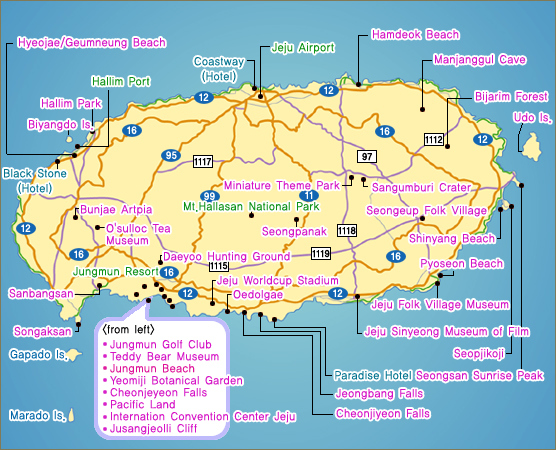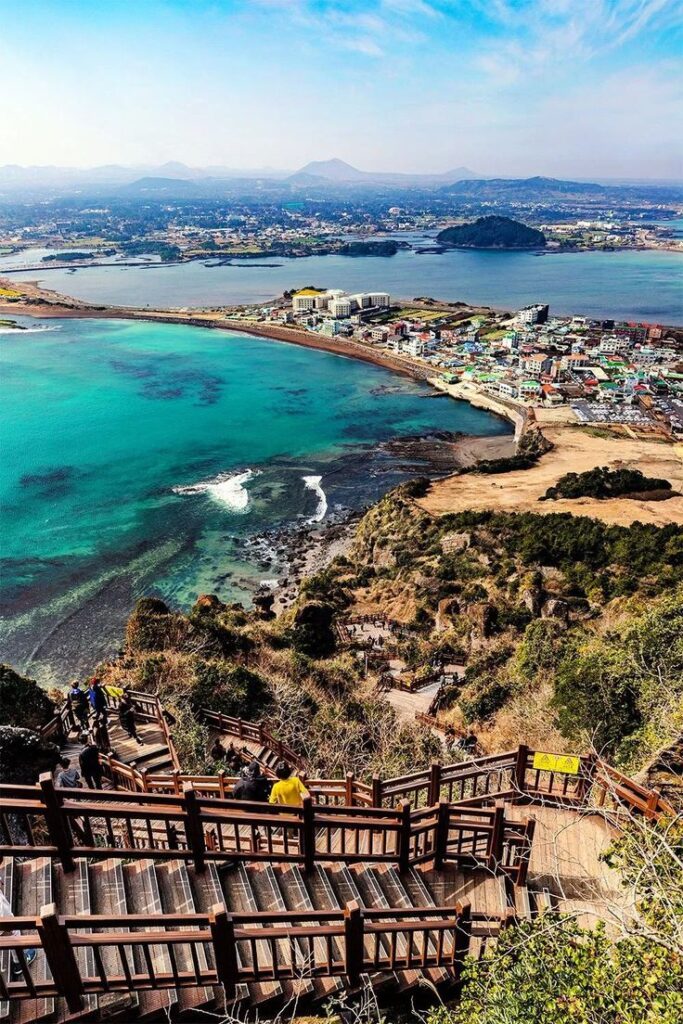Are you ready to embark on a breathtaking journey to the stunning Jeju Island? Look no further for your essential travel guide to this South Korean paradise. From its picturesque landscapes and pristine beaches to its rich cultural heritage, Jeju Island has something for everyone. Explore the majestic Hallasan Mountain or marvel at the awe-inspiring Manjanggul Cave. Indulge in authentic local cuisine and immerse yourself in the traditional Jeju culture. Whether you’re an adventure seeker, a nature enthusiast, or a lover of history, Jeju Island promises an unforgettable experience you won’t want to miss. So pack your bags and get ready to create memories that will last a lifetime!
When to Visit Jeju Island

Spring
Spring is a wonderful time to visit Jeju Island. The weather is pleasant with temperatures ranging from 10 to 20 degrees Celsius. The island comes alive with beautiful cherry blossoms in full bloom, offering a picturesque sight. Spring also marks the arrival of vibrant azaleas, covering the island with a carpet of breathtaking colors. It’s the perfect time for nature lovers and photography enthusiasts to capture the island’s natural beauty.
Summer
If you love the sun, sand, and sea, then summer is the best time to visit Jeju Island. The temperatures range between 20 to 30 degrees Celsius, making it perfect for beach activities and water sports. Haeundae Beach and Jungmun Beach are popular choices among tourists. July and August are the months when Jeju receives the maximum number of tourists, so expect a lively atmosphere and bustling beaches during this time.
Autumn
Autumn in Jeju Island is a magical experience. From mid-September to November, the island transforms into a kaleidoscope of autumn colors. The temperature cools down to a comfortable range of 10 to 20 degrees Celsius, providing the perfect weather for outdoor activities. The iconic Hallasan Mountain and Seongsan Ilchulbong Peak are a must-visit during this season as they offer stunning panoramic views of the autumn foliage.
Winter
Although Jeju Island experiences relatively mild winters compared to mainland Korea, the temperature still drops to around 0 to 10 degrees Celsius. Winter is a great time to experience the island’s unique charm without the crowds. The landscapes turn into winter wonderlands, and if you’re lucky, you might even catch a rare snowfall. Don’t miss the opportunity to visit the famous Seongsan Ilchulbong Peak during sunrise for a truly breathtaking experience.
Getting to Jeju Island
By Air
The easiest and fastest way to reach Jeju Island is by air. Jeju International Airport is well-connected and offers domestic and international flights. There are numerous airlines operating daily flights from major cities in South Korea, as well as from other Asian countries. The flight duration from Seoul to Jeju Island is approximately one hour, making it a convenient option for travelers.

By Sea
If you prefer a more scenic journey, you can reach Jeju Island by sea. Ferry services operate from various ports in South Korea, including Incheon, Busan, and Mokpo, to Jeju Island. The ferry ride offers a unique experience and allows you to enjoy the mesmerizing views of the ocean. However, please note that the travel time by sea is considerably longer compared to air travel.
Transportation on Jeju Island
Public Transportation
Jeju Island has a well-developed public transportation system, making it easy for visitors to explore the island. Buses are the most common mode of public transport, with regular routes connecting major towns and attractions. The bus fare is affordable, and the buses are clean and comfortable. English announcements and signage are also available on most buses, making it convenient for non-Korean speakers.
Taxis
Taxis are another popular mode of transportation on Jeju Island, especially for travelers who prefer more flexibility and convenience. Taxis are readily available throughout the island, and the drivers are generally friendly and helpful. It’s important to note that most taxi drivers in Jeju Island do not speak English fluently, so it’s advisable to carry a map or have your destination written in Korean to avoid any communication barriers.
Rental Cars
If you prefer to have complete control over your itinerary and explore Jeju Island at your own pace, renting a car is a great option. There are numerous car rental companies available at Jeju International Airport and in major towns. However, an international driving license is required to rent a car in Jeju Island. The island has well-maintained roads and scenic routes, making it a delightful experience to drive around and discover hidden gems.
Where to Stay in Jeju Island
Jeju City
Jeju City is the capital of Jeju Island and a popular choice for tourists due to its central location and excellent transportation links. The city offers a wide range of accommodation options, from luxury hotels to budget-friendly guesthouses. It also boasts a vibrant nightlife scene, with numerous restaurants, bars, and entertainment venues. Jeju City is an ideal base for exploring nearby attractions such as Dragon Head Rock and Yongduam Rock.

Seogwipo
Seogwipo is another popular area to stay in Jeju Island, known for its stunning coastal landscapes and natural beauty. The city is home to attractions like Cheonjiyeon Waterfall and Jeongbang Waterfall. Seogwipo also offers a variety of accommodation options, ranging from resorts and spa hotels to cozy guesthouses. The city’s tranquil atmosphere and proximity to nature make it a perfect choice for those seeking a peaceful getaway.
Other Regions
Apart from Jeju City and Seogwipo, there are other regions on Jeju Island that offer unique experiences and accommodations. If you’re interested in exploring rural landscapes and experiencing traditional Jeju culture, consider staying in a guesthouse or a hanok (traditional Korean house) in one of the smaller towns or villages. These areas provide a glimpse into the local way of life and offer a more authentic experience.
Must-See Attractions in Jeju Island
Hallasan National Park
Hallasan National Park is a must-visit attraction for nature enthusiasts and hikers. It is home to Hallasan, the highest mountain in South Korea. The park offers various hiking trails of different difficulty levels, allowing visitors to enjoy the stunning landscapes and breathtaking views from the mountain summit. The crater lake, Baekrokdam, is another highlight of the park, offering a tranquil and picturesque setting.
Seongsan Ilchulbong Peak
Seongsan Ilchulbong Peak, also known as Sunrise Peak, is a UNESCO World Heritage Site and one of the most iconic landmarks in Jeju Island. The volcanic cone stands majestically against the backdrop of the ocean, offering spectacular views. The peak is particularly popular for witnessing the sunrise, creating a captivating scene as the first rays of light illuminate the surrounding landscape. The climb to the top is moderate, making it accessible for all fitness levels.
Jeju Loveland
For a unique and slightly unconventional experience, a visit to Jeju Loveland is a must. Jeju Loveland is an outdoor sculpture park showcasing various erotic and playful artworks. It’s a quirky and light-hearted attraction that celebrates love, relationships, and human sexuality. The park provides an interesting blend of art, humor, and cultural exploration.

Jeju Folk Village
Step back in time and immerse yourself in traditional Jeju culture at Jeju Folk Village. This open-air museum showcases traditional Jeju houses, known as hanok, and offers a glimpse into the island’s rich history and heritage. The village also hosts cultural performances and events, allowing visitors to experience traditional music, dance, and crafts. It’s a great opportunity to learn about the island’s customs and traditions firsthand.
Outdoor Activities in Jeju Island
Hiking
Jeju Island is a paradise for hikers, offering a wide range of hiking trails suitable for all levels of expertise. From the challenging climb to the summit of Hallasan Mountain to the scenic coastal trails of Olle, there is a trail for every hiker’s preference. The island’s diverse landscapes, including volcanic craters, waterfalls, and coastal cliffs, provide a stunning backdrop for nature enthusiasts.
Horseback Riding
Experience Jeju Island’s beauty from a unique perspective by going on a horseback riding adventure. Numerous horse ranches on the island offer guided horseback riding tours, allowing visitors to explore scenic trails while riding gentle horses. Whether you’re a beginner or an experienced rider, horseback riding in Jeju Island is a memorable experience that allows you to appreciate the island’s natural landscapes in a different way.
Water Sports
Jeju Island’s crystal-clear waters and gentle currents make it a paradise for water sports enthusiasts. Snorkeling, scuba diving, and kayaking are popular activities, allowing visitors to explore the vibrant marine life and underwater caves. From beginner-friendly spots to advanced diving sites, Jeju Island offers a variety of options for water sports lovers of all skill levels.
Cycling
With its well-maintained cycling routes and scenic landscapes, Jeju Island is a fantastic destination for cycling enthusiasts. There are numerous rental shops on the island where you can rent bicycles and explore at your own pace. The coastal routes offer breathtaking views of the ocean, while the inland routes take you through rural villages and picturesque farmlands. Cycling is a great way to immerse yourself in the island’s natural beauty while staying active.
Cultural Experiences in Jeju Island

Kimchi Making
Kimchi is a staple in Korean cuisine, and learning how to make it is a fun and engaging cultural experience. Many guesthouses and cultural centers offer kimchi making workshops, where you can learn the traditional methods of preparing and fermenting kimchi. You’ll get to experience firsthand the meticulous process of washing, seasoning, and packaging the kimchi. Not only will you learn a new skill, but you’ll also gain a deeper appreciation for Korean culinary traditions.
Hanbok Dressing
Hanbok is the traditional Korean attire, and trying on a hanbok is an excellent way to immerse yourself in Korean culture. There are several hanbok rental shops in Jeju Island that offer a wide range of colorful hanbok designs for both men and women. Dressing up in hanbok allows you to experience the elegance and grace of traditional Korean fashion. It’s also a fantastic opportunity to take memorable photos against the stunning backdrop of Jeju Island’s scenic beauty.
Tangerine Picking
Jeju Island is famous for its delicious tangerines. Visiting a tangerine farm during the harvest season, usually from November to February, allows you to pick your own fresh tangerines and enjoy them straight from the trees. The experience is not only enjoyable but also provides an insight into the island’s agricultural traditions. You can savor the sweetness of the locally grown tangerines while creating lasting memories with family and friends.
Traditional Tea Ceremony
Embark on a tranquil journey into the world of Korean tea culture by participating in a traditional tea ceremony. Several teahouses in Jeju Island offer immersive tea experiences, where you can learn about different types of Korean tea, their health benefits, and the art of tea preparation. The serene ambiance, coupled with the soothing aroma of tea, creates a moment of relaxation and reflection, allowing you to connect with the island’s cultural heritage.
Jeju Island’s Local Cuisine
Jeju Black Pork
Jeju Island is renowned for its succulent and flavorful black pork. The pigs are raised in clean and natural environments, resulting in tender and juicy meat. There are numerous restaurants on the island that specialize in serving Jeju black pork, offering a variety of dishes such as samgyeopsal (grilled pork belly) and dwaeji galbi (grilled pork ribs). Make sure to indulge in this local delicacy for an authentic culinary experience.
Haemul Jeongol
Haemul jeongol, also known as seafood hot pot, is a popular dish in Jeju Island. Made with an assortment of fresh seafood such as clams, shrimp, squid, and fish, the hot pot is cooked at the table, allowing the flavors to meld together. The broth is rich and savory, and the combination of seafood and vegetables creates a hearty and satisfying meal. It’s an excellent choice for seafood lovers seeking a taste of Jeju Island’s culinary delights.
Bibimbap
Bibimbap is one of Korea’s most famous dishes, and Jeju Island has its own unique twist on this classic. Jeju-style bibimbap typically includes local ingredients such as abalone, sea cucumber, and Jeju black pork. The dish is a colorful medley of vegetables, meat, and a fried egg served over a bowl of steamed rice. It’s a delightful combination of flavors and textures, and a must-try for anyone visiting Jeju Island.
Fresh Seafood
Being an island, Jeju is blessed with an abundance of fresh seafood. From sashimi to grilled fish, there’s a wide variety of seafood dishes to choose from. The local fish markets are the best places to sample the freshest catches of the day. You can try delicacies like hoe (raw fish) and gimbap (rice rolls filled with seafood and vegetables) while enjoying the lively atmosphere of the market. For seafood lovers, Jeju Island is a culinary paradise that shouldn’t be missed.
Shopping in Jeju Island
Duty-Free Shops
Jeju Island is a duty-free haven, offering a wide range of duty-free shops where you can indulge in tax-free shopping. These shops are located in popular areas such as Jeju International Airport and downtown Jeju City. You can find a variety of products, including cosmetics, fashion, electronics, and local specialties. Duty-free shopping is a great way to take home souvenirs and enjoy discounted prices on high-quality products.
Traditional Markets
For a more traditional shopping experience, head to one of Jeju Island’s bustling markets. Dongmun Market in Jeju City is the largest traditional market on the island, offering a wide range of fresh produce, local street food, and handicrafts. It’s a vibrant and bustling place where you can immerse yourself in the local culture and sample authentic Jeju snacks. Other markets like Seogwipo Maeil Olle Market and Jeju 4.3 Square Market are also worth a visit.
Souvenir Shops
Souvenir shops are scattered throughout Jeju Island, offering a variety of unique and traditional items to bring back home. From Jeju-themed keychains and magnets to traditional crafts and handmade goods, there’s something for everyone. These shops are perfect for picking up souvenirs to remind you of your time on the island or to share a piece of Jeju’s charm with family and friends.
Safety Tips for Travelers in Jeju Island
Emergency Contacts
It’s always important to be prepared for emergencies when traveling. Make sure to save important contact numbers in your phone, including the local police, fire department, and medical services. In case of any unforeseen situations, you can quickly reach out for assistance. It’s also advisable to carry a copy of your passport and travel insurance details with you at all times.
Weather Precautions
Jeju Island’s weather can be unpredictable, so it’s essential to check the weather forecast before heading out. Pack appropriate clothing and accessories to protect yourself from extreme weather conditions, such as sunblock and hats for sunny days, or warm layers for winter visits. It’s also a good idea to carry some rain gear, as Jeju Island can experience sudden showers. Stay hydrated and take regular breaks to rest during outdoor activities.
Nature Safety
While exploring Jeju Island’s stunning natural landscapes, it’s important to prioritize safety. Stick to designated trails when hiking and follow any safety instructions provided by park authorities. Respect the environment and avoid littering or damaging any flora or fauna. If engaging in water activities, make sure to follow safety guidelines and check for any warnings or advisories. Be cautious of strong currents or changing tides and ensure that you have the necessary equipment and skills for each activity.
In conclusion, Jeju Island is a breathtaking destination that offers a wide range of experiences for visitors. Whether you’re a nature lover, an adventure seeker, or a culture enthusiast, there is something for everyone on this beautiful island. From exploring stunning landscapes and indulging in delicious local cuisine to engaging in traditional cultural activities, Jeju Island is a destination that will leave you with unforgettable memories. So pack your bags, plan your trip, and get ready to embark on an incredible adventure in Jeju Island.

